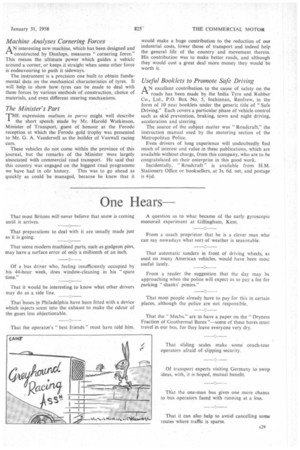One Hears
Page 31

If you've noticed an error in this article please click here to report it so we can fix it.
That most Britons will never believe that snow is coming until it arrives.
That preparations to deal with it are usually made just as it is going.
That some modern machined parts, such as gudgeon pins, may have a surface error of only a millionth of an inch.
Of a bus driver who, feeling insufficiently occupied by his 44-hour week, does window-cleaning in his "spare time."
That it would be interesting to know what other drivers may do as a side line.
That buses in Philadelphia have been fitted with a device which injects scent into the exhaust to make the odour of the gases less objectionable.
That the operator's "best friends" must have told him. A question as to what became of the early gyroscopic monorail experiment at Gillingham, Kent.
From a coach proprietor that he is a clever man who can say nowadays what sort of weather is seasonable.
That automatic sanders in front of driving wheels, as used on many American vehicles, would have been most useful lately.
From a reader the suggestion that the day may be approaching when the police will expect us to pay a fee for parking "shanks' ponies."
That most people already have to pay for this in certain places, although the police are not responsible.
That the Mechs." are to have a paper on the " Dryness Fraction of Geothermal Bores "—some of these bores must travel in our bus, for they leave everyone very dry.
That sliding scales make some coach-tau] operators afraid of slipping security.
Of transport experts visiting Germany to swop ideas, with, it is hoped, mutual benefit.
Th'at the one-man bus gives one more chance to bus operators faced with running at a loss.
That it can also help to avoid cancelling some routes where traffic is sparse.




































































































